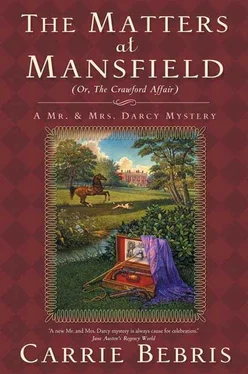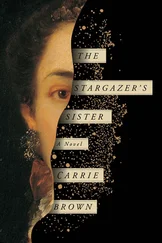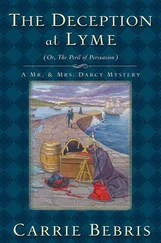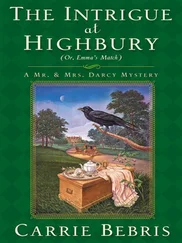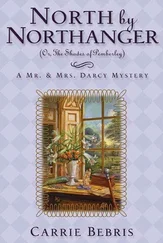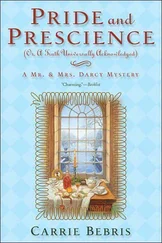“Begging your pardon, sir, but I saw the accident earlier. I hope that Mrs. Crawford will recover?”
Darcy had to give the man credit. He wondered how long the laborer had been formulating an acceptable way to initiate conversation with a gentleman on whom he had no claim. He looked up from his letter. “Are you acquainted with the Crawfords?”
“Not directly, sir. But for a time, Mr. Crawford was often seen about the village.”
“A guest of our minister, Dr. Grant,” interjected another member of the party, a young scrawny fellow with a friendly but pockmarked countenance. The others called him Spriggs.
“Yes, Dr. Grant,” Hobson said. “Mrs. Grant is Mr. Crawford’s sister—”
“Half sister,” Spriggs corrected.
“—so Mr. Crawford is known around the neighborhood. He didn’t spend much time in the village — he was mostly up at Mansfield Park — but he’d offer a nod as he rode through, which is more than we ever received from Miss Crawford.”
“Mary Crawford — that’s Mr. Crawford’s full sister,” Spriggs, apparently the Crawford family’s official genealogist, clarified for Darcy’s benefit. “Have you met her?”
“I have not had the pleasure.”
“Quite a beauty, Miss Crawford.”
Hobson scowled. “Trouble is, she knows it.”
“She lives with the Grants, but they all moved to London nearly a twelvemonth ago. Dr. Grant got himself a stall in Westminster.”
“He ought to give up the living here if you ask me.” Hobson drained his glass. “Damned selfish, I say, collecting his salary while the rectory sits empty and Mr. Bertram covers the Mansfield parish duties in addition to his own at Thornton Lacey. Especially after the scandal with Mr. Bertram’s sister.”
“Miss Bertram was no innocent,” muttered a man at a nearby table.
“Mrs. Rushworth, you mean. When she gave up the name Bertram, Mr. Crawford should have given up her. No gentleman has any business running off with another man’s wife.”
“No proper lady, married or not, would have gone.”
Darcy signaled the serving girl to bring the men another round.
“Well, don’t let Mrs. Norris hear you saying such about her niece, or she’ll make your ears burn.”
“Let her rail. What does anyone care about that old busybody’s opinion? Even Sir Thomas doesn’t. Won’t receive his own daughter, and I say good riddance. If my Nellie ever brought such shame on my house, I’d cast her out — and castrate the dog she ran off with.”
“I’d leave that satisfaction to her cuckolded husband.”
“Rushworth is outraged enough to do it. He won’t take her back, and I hear he’s actually going to divorce her.”
“Put her and Mr. Crawford on trial?”
Just then the apothecary descended the staircase. Though Darcy regretted his timing — he wanted to learn more about Mr. Crawford — anxiety for Anne propelled him away from Hobson’s conversation.
“Mrs. Crawford is fortunate,” said Mr. Dawson. “Though her leg is terribly bruised and swollen, it appears to be unbroken. I believe the recent rain softened the ground enough that her limb sank into the earth when the carriage wheel rolled over it. She is in a great deal of pain, however, and I recommend she not travel for at least a fortnight.”
Darcy added the essentials of Mr. Dawson’s report to his letter and arranged for it to be dispatched to Riveton posthaste. By the time he completed his task, Hobson and his comrades had disbanded, taking their elucidating discussion with them.
He went upstairs. Mr. Crawford answered his knock and admitted him. Mrs. Gower had departed, leaving Henry alone with Anne, who lay sleeping. Someone had helped her out of her muddy clothes and into a nightdress, barely visible beneath the quilt tucked around her. Darcy could not see the injured leg at all.
“Mr. Dawson gave her laudanum.” Mr. Crawford pushed a stray lock of hair away from Anne’s eyes. “Her sleep was fitful at first, but I believe she rests more comfortably now.”
“I have sent word to Riveton of the accident.”
“Thank you. That was a duty to which I did not look forward.”
“Do not thank me yet. While I composed the letter, several other patrons in the dining room engaged in a most intriguing conversation. Do you care to speculate as to its subject?”
Mr. Crawford had the decency to appear uncomfortable. “Henry Crawford?”
“Indeed. And one Mrs. Rushworth.”
“There are many other villages in which I would rather find myself.”
“Anne confided to me that you had recently ended an affair with a married lady. I now presume she referred to Mrs. Rushworth — unless you maintain a succession of mistresses?”
“No, only the one. Though lately I have contemplated starting a harem.”
Darcy’s lack of amusement eradicated Mr. Crawford’s attempt at wit. His grin faded.
“Trust me, one such as Maria Rushworth is enough,” Mr. Crawford said more soberly. “She is willful and vain and selfish, and I believe I felt more regret at her disloyalty toward her husband than she did. Believe it or not, it was she who persuaded me to elope. I had not lived with her above a month before I realized my error, and prolonged the affair only in the failed hope that my feelings would rekindle to what they ought to be after the misery our liaison had caused all her family. I felt an obligation to remain with her, but finally I could not live the falsehood any longer.”
“I am to understand that honesty led you to sever the association?”
“Ironic, is it not? That a relationship born in deception should end with the belated emergence of integrity? But so it did. I am a reformed man, Mr. Darcy. From this day forward, the only wives I seduce will be my own.”
With Anne asleep, Mr. Crawford went downstairs to face Mr. Gower. He either ignored or was oblivious to the innkeeper’s ill will as he signed the register, his right hand sweeping across the page as he formed a flourish at the end of his name. His autograph dominated the folio, nearly eclipsing the more restrained signature of a Mr. Lautus whose name appeared above.
Mr. Crawford seemed to move through the world with a dramatic flair that spilled out onto everything he touched. Darcy hoped for Anne’s sake it would not overrun her.
“You can be at no loss… to understand the reason of my journey hither. .. you ought to know, that I am not to be trifled with.”
—
Lady Catherine ,
Pride and Prejudice
In the space of four-and-twenty hours, the Ox and Bull shrank. Somehow the inn that had lounged on the village green spreading its cobbled-together wings in lazy imitation of more formal guesthouses now seemed to stand at attention, its walls constricting as it labored to contain the company within.
It was the wind, some said. A summer gale had ruffled the village the full length of that unseasonably stormy day. By dusk, it had blown in a force of nature stronger than any Mansfield had previously known.
Lady Catherine de Bourgh.
Her ladyship came accompanied by Elizabeth, who nearly tumbled out of the chaise in her haste to escape after the longest ride of her life — measured not by distance, but by the perceived movement of time. Though Lady Catherine had ordered a grueling pace, so fractious had been the atmosphere within the carriage that Elizabeth felt no horses in the world could convey them to Mansfield quickly enough. Her ladyship’s indignation over the elopement, now nursed for more than a se’nnight, teamed with anxiety for Anne’s health and conviction of Mr. Crawford’s negligence to render Darcy’s aunt the most cross passenger with whom Elizabeth had ever had the misfortune of being trapped in an enclosed vehicle.
Читать дальше
